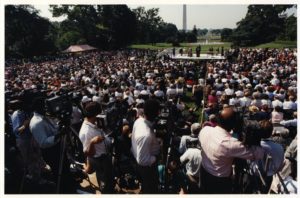In 2019, The Americans with Disabilities Act Turns 29. As it teeters on the precipice of a new decade, it made us think about how the ADA will continue to develop civil rights policy of tomorrow. As we move toward the ADA Anniversary join us as we review some ideas about the ADA’s past and hopes for the future.

Hundreds gather on the South Lawn of the White House on July 25, 1990, to hear President George H.W. Bush speak minutes prior to signing the Americans with Disabilities Act of 1990.
In July, many members of the Disability Community look toward the 26th of July and recollect all of the hard work and advocacy that led to a warm sunny day on the White House Grounds where George H.W. Bush signed the Americans with Disabilities Act (ADA) to “let the shameful wall of exclusion finally come tumbling down.” While ADA Day is a day of remembrance and hope for many, it has not quite caught on as a day of celebration for all Americans. Though we all benefit from the protections of the ADA, for many who still have a negative view of disability, ADA day may not seem like a celebration. For these who may not understand disability as a natural part of life, they may view the ADA as a retreat rather than a testament to inclusion for all. Unfortunately, the same may also hold true for many of those in the business world. While disability pride is becoming more visible and accepted in the almost 30 years of the ADA, many businesses still see the legislation as a regulatory change rather than a watermark of freedom and inclusion. With these negative thoughts around disability still being present in our society, the need to celebrate disability inclusion and note the importance of all legislation promoting inclusion in our society is more important than ever.
Much like the celebration of the International Day of Persons with Disabilities, recognizing Disability inclusion in America allows us to “to promote the rights and well-being of persons with disabilities in all spheres of society and development, and to increase awareness of the situation of persons with disabilities in every aspect of political, social, economic and cultural life.” By specifically recognizing our own landmark legislation we have the opportunity to connect the values of disability inclusion along with those that make up the fabric of our own American identity – freedom, justice and equality. The celebration of the ADA becomes even more poignant as multiple groups in the U.S. become more familiar with the values of inclusion and take an intersectional approach to creating inclusive spaces, and methods for expression, support and advocacy. With disability being the only marginalized community that crosses all racial, socio-economic, and ethnic groups, AND can be joined at any time, a celebration of the ADA and its values is a celebration for all Americans . The ADA represents a foothold for freedom for our parents, friends, children and families to always have access to our communities, and have the opportunity to participate on a level playing field regardless of our disability or chronic condition. To do so gives all Americans access to what Justin Dart called “an absolutely essential legal and educational tool to achieve equality and to achieve employment — a promise to be kept that all people will be fully equal, fully productive, fully prosperous, and fully welcome.” This year on July 26th let us re-examine the values of inclusion and access put forth in the ADA and recognize the push of disability activists, allies, families, communities, policymakers and friends to create a world in which the lives and experiences of all are valued and included. Let us all find ourselves in the ADA and celebrate the promise made for all Americans.
ADA day can be used to celebrate all victories of inclusion for the Disability Community. Learn how we have also benefitted from the Olmstead Decision and how this July 26th may be an excellent time to acknowledge that success as well.


